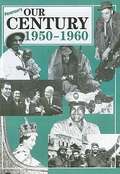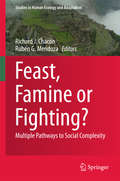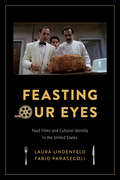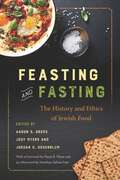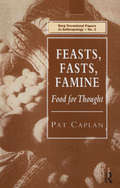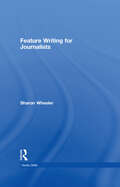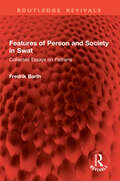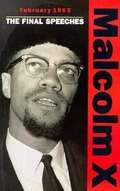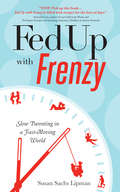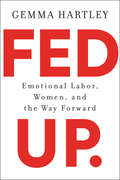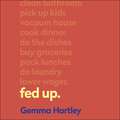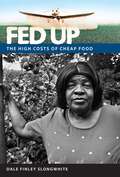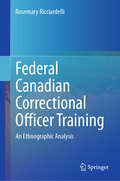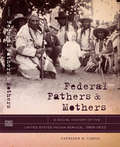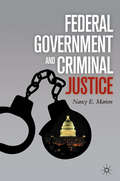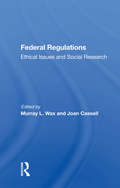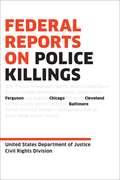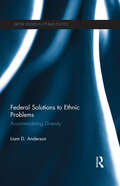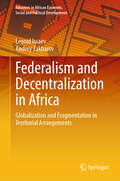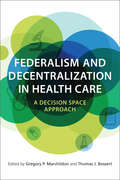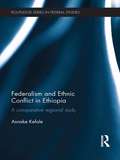- Table View
- List View
Fearon's Our Century 1950-1960
by S. D. JonesThis “magazine” style history series reinforces the reality of history and makes reading about it more engaging to the student. Topics include daily life, around the world, back at home, sports world, arts, people in the news, and more. Reading Level: 3-4 Interest Level: 6-12
Feasible Management of Archaeological Heritage Sites Open to Tourism
by Douglas C. Comer Annemarie WillemsArchaeological sites opened to the public, and especially those highly photogenic sites that have achieved iconic status, are often major tourist attractions. By opening an archaeological site to tourism, threats and opportunities will emerge.The threats are to the archaeological record, the pre-historic or historic materials in context at the site that can provide facts about human history and the human relationship to the environment. The opportunities are to share what can be learned at archaeological sites and how it can be learned. The latter is important because doing so can build a public constituency for archaeology that appreciates and will support the potential of archaeology to contribute to conversations about contemporary issues, such as the root causes and possible solutions to conflict among humans and the social implications of environmental degradation. In this volume we will consider factors that render effective management of archaeological sites open to the public feasible, and therefore sustainable. We approach this in two ways: The first is by presenting some promising ways to assess and enhance the feasibility of establishing effective management. Assessing feasibility involves examining tourism potential, which must consider the demographic sectors from which visitors to the site are drawn or might be in the future, identifying preservation issues associated with hosting visitors from the various demographic sectors, and the possibility and means by which local communities might be engaged in identifying issues and generating long-term support for effective management. The second part of the book will provide brief case studies of places and ways in which the feasibility of sustainable management has been improved.
Feast, Famine or Fighting?: Multiple Pathways to Social Complexity (Studies in Human Ecology and Adaptation #8)
by Richard J. Chacon Rubén G. MendozaThe advent of social complexity has been a longstanding debate among social scientists. Existing theories and approaches involving the origins of social complexity include environmental circumscription, population growth, technology transfers, prestige-based and interpersonal-group competition, organized conflict, perennial wartime leadership, wealth finance, opportunistic leadership, climatological change, transport and trade monopolies, resource circumscription, surplus and redistribution, ideological imperialism, and the consideration of individual agency.However, recent approaches such as the inclusion of bioarchaeological perspectives, prospection methods, systematically-investigated archaeological sites along with emerging technologies are necessarily transforming our understanding of socio-cultural evolutionary processes. In short, many pre-existing ways of explaining the origins and development of social complexity are being reassessed. Ultimately, the contributors to this edited volume challenge the status quo regarding how and why social complexity arose by providing revolutionary new understandings of social inequality and socio-political evolution.
Feast: Food That Celebrates Life
by Nigella LawsonFeast is written to stand alongside Nigella’s classic and best loved book, How to Eat. Comprehensive and informed, this stunning new book will be equally at home in the kitchen or on the bedside table. A feast for both the eyes and the senses, written with Nigella Lawson’s characteristic flair and passion, Feast: Food that Celebrates Life is a major book in the style of her classic How to Eat, applying Nigella’s “Pleasures and Principles of Good Food” to the celebrations and special occasions of life. Essentially about families and food, about public holidays and private passions, about how to celebrate the big occasions and the small everyday pleasures — those times when food is more than just fuel — Feast takes us through Christmas, Thanksgiving and birthdays, to Passover and a special Sardinian Easter; from that first breakfast together to a meal fit for the in-laws; from seasonal banquets of strawberries or chestnuts to the ultimate chocolate cake; from food for cheering up the “Unhappy Hour” to funeral baked-meats; from a Georgian feast to a love-fest; from Nigella’s all-time favourite dish to a final New Year fast. Evocative, gorgeous, refreshingly uncomplicated and full of ideas, Feast proclaims Nigella’s love of life and great food with which to celebrate it. Packed with over 200 recipes from all over the world — and from near home — with helpful menus for whole meals, and more than 120 colour photographs, Feast is destined to become a classic. From the Hardcover edition.
Feasting Our Eyes: Food Films and Cultural Identity in the United States
by Fabio Parasecoli Laura LindenfeldBig Night (1996), Ratatouille (2007), and Julie and Julia (2009) are more than films about food—they serve a political purpose. In the kitchen, around the table, and in the dining room, these films use cooking and eating to explore such themes as ideological pluralism, ethnic and racial acceptance, gender equality, and class flexibility—but not as progressively as you might think. Feasting Our Eyes takes a second look at these and other modern American food films to emphasize their conventional approaches to nation, gender, race, sexuality, and social status. Devoured visually and emotionally, these films are particularly effective defenders of the status quo.Feasting Our Eyes looks at Hollywood films and independent cinema, documentaries and docufictions, from the 1990s to today and frankly assesses their commitment to racial diversity, tolerance, and liberal political ideas. Laura Lindenfeld and Fabio Parasecoli find women and people of color continue to be treated as objects of consumption even in these modern works and, despite their progressive veneer, American food films often mask a conservative politics that makes commercial success more likely. A major force in mainstream entertainment, American food films shape our sense of who belongs, who has a voice, and who has opportunities in American society. They facilitate the virtual consumption of traditional notions of identity and citizenship, reworking and reinforcing ingrained ideas of power.
Feasting and Fasting: The History and Ethics of Jewish Food (Latina/o Sociology #Vol. 50)
by Jody Myers Hasia R Diner Aaron S Gross Jordan D RosenblumHow Judaism and food are intertwined Judaism is a religion that is enthusiastic about food. Jewish holidays are inevitably celebrated through eating particular foods, or around fasting and then eating particular foods. Through fasting, feasting, dining, and noshing, food infuses the rich traditions of Judaism into daily life. What do the complicated laws of kosher food mean to Jews? How does food in Jewish bellies shape the hearts and minds of Jews? What does the Jewish relationship with food teach us about Christianity, Islam, and religion itself? Can food shape the future of Judaism? Feasting and Fasting explores questions like these to offer an expansive look at how Judaism and food have been intertwined, both historically and today. It also grapples with the charged ethical debates about how food choices reflect competing Jewish values about community, animals, the natural world and the very meaning of being human. Encompassing historical, ethnographic, and theoretical viewpoints, and including contributions dedicated to the religious dimensions of foods including garlic, Crisco, peanut oil, and wine, the volume advances the state of both Jewish studies and religious studies scholarship on food. Bookended with a foreword by the Jewish historian Hasia Diner and an epilogue by the novelist and food activist Jonathan Safran Foer, Feasting and Fasting provides a resource for anyone who hungers to understand how food and religion intersect.
Feasts, Fasts, Famine: Food for Thought (Occasional Papers In Anthropology Ser. #Vol. 2)
by Pat CaplanThis study deals with three domains of food which raise complex epistemological, political and moral issues. Through an examination of a wide range of material drawn from anthropology, history, literature and political economy, the author discusses the relationship between food and entitlement, gender, notions of the body and development. Food is shown to be a powerful metaphor for our sense of self, our social and political relations, our cosmology and our global system.
Feature Writing for Journalists (Media Skills)
by Sharon WheelerFeature Writing for Journalists considers both newspapers and magazines and helps the new or aspiring journalist to become a successful feature writer. Using examples from a wide range of papers, specialist and trade magazines and 'alternative' publications, Sharon Wheeler considers the different types of material that come under the term 'feature' including human interest pieces, restaurant reviews and advice columns. With relevant case studies as well as interviews with practitioners, Feature Writing for Journalists is exactly what you need to understand and create exciting and informative features.
Features of Person and Society in Swat: Collected Essays on Pathans (Routledge Revivals)
by Fredrik BarthFirst published in 1981, Features of Person and Society in Swat brings together Professor Barth’s writings on the Swat Pathans. Professor Barth’s investigations of Swat Pathan society revealed aspects which were often at variance with the prevailing anthropological paradigm of the 1950s, and in which were seen elements of a more realistic paradigm of the relation between the individual and society.The book also addresses more specific, theoretical challenges which arose from the material. These include an early venture into ecologic analysis, the application of the theory of games to the main lineaments of a political system, an analysis of social stratification and caste, and the processes at work in ethnic differentiation and identity in a situation of social inequality.The last chapter in this volume readdresses several of these issues and deals further with issues that have been raised by others in their critiques and commentaries on Professor Barth’s work in this area.
February 1965: The Final Speeches
by Malcolm X Steve ClarkDuring the three weeks prior to his assassination on February 21, 1965, Malcolm X spoke to audiences in Britain and France and across the U.S. This is the first in a series of books that will collect--in chronological order--the major speeches and writings of this great revolutionary thinker and leader of the 20th century.
Fed Up with Frenzy
by Susan Sachs LipmanSlow Down. Reconnect. It's Easier than You Think. The hectic pace of everyday life can keep families constantly on the go, but removing some of the frenzy is easy--if you just take a moment to slow down. Hit the pause button on all of life's daily distractions and reconnect with your family in familiar and exciting ways. Parenting and family expert Susan Sachs Lipman shows you the enormous benefits of having a slower paced, more connected family. Packed with simple, affordable, and delightful games, crafts, and activities, Fed Up with Frenzy will help you spend more distraction--free time with your children. Slow down and reconnect with your family by: Creating your own outdoor theater Experimenting with kitchen science Playing nature games Making placemats from fall leaves And more! "Fed Up with Frenzy is a blueprint for any family that feels overwhelmed by the pace of contemporary life." --Darell Hammond, Founder and CEO, KaBOOM! "The heart of parenting is connection, but how do parents and children connect when they are going a mile a minute in different directions? Read this book, stop the frenzy, and reconnect." --Lawrence J. Cohen, PhD, author of Playful Parenting "Fed up with Frenzy is a welcome corrective to a society that has turned childhood into a race to nowhere. With charm, energy and wit, Susan Lipman serves up a treasure trove of ideas to bring joy and sanity back to family life. Every parent needs a copy."--Carl Honoré, author of In Praise of Slowness and Under Pressure
Fed Up: Emotional Labor, Women, and the Way Forward
by Gemma HartleyA bold dive into the emotional labor women have shouldered for far too long—and an impassioned vision for creating a better future for us all.Day in, day out, women anticipate and manage the needs of others. In relationships, we initiate the hard conversations. At home, we shoulder the mental load required to keep our households running. At work, we moderate our tone, explaining patiently and speaking softly. In the world, we step gingerly to keep ourselves safe. We do this largely invisible, draining work whether we want to or not—and we never clock out. No wonder women everywhere are overtaxed, exhausted, and simply fed up.In her ultra-viral article “Women Aren’t Nags—We’re Just Fed Up,” shared by millions of readers, Gemma Hartley gave much-needed voice to the frustration and anger experienced by countless women. Now, in Fed Up, Hartley expands outward from the everyday frustrations of performing thankless emotional labor to illuminate how the expectation to do this work in all arenas—private and public—fuels gender inequality, limits our opportunities, steals our time, and adversely affects the quality of our lives.More than just name the problem, though, Hartley teases apart the cultural messaging that has led us here and asks how we can shift the load. Rejecting easy solutions that don’t ultimately move the needle, Hartley offers a nuanced, insightful guide to striking real balance, for true partnership in every aspect of our lives. Reframing emotional labor not as a problem to be overcome, but as a genderless virtue men and women can all learn to channel in our quest to make a better, more egalitarian world, Fed Up is surprising, intelligent, and empathetic essential reading for every woman who has had enough with feeling fed up.
Fed Up: Navigating and redefining emotional labour for good
by Gemma HartleyGemma Hartley wrote an article in Harper's Bazaar in September 2017 called 'Women Aren't Nags - We're Just Fed Up', which instantly went viral.The piece, and this book, are about 'emotional labour', i.e. the unpaid, often unnoticed effort and work that goes into keeping everyone around you comfortable and happy.The Problem That Had No Name tackles the big issues surrounding emotional labour: the historical underpinnings and roots in feminism, the benefits and burdens of this kind of effort, and the specific contexts where emotional labour plays a major but undervalued role, including relationships, work, sex, parenting, politics and self-care.
Fed Up: Navigating and redefining emotional labour for good
by Gemma HartleyA ground-breaking exploration of feminism's most buzzy topic.No more grin and bear it: how and why we all need to reset the domestic balance. Gemma Hartley is a mother and journalist on a mission: to throw fresh light on the hidden burden of 'emotional labour' (washing, wiping, worrying, soothing, shopping, preparing, planning, cooking, caring), and find out why it is that the bulk of these thankless, hugely time-consuming and frustrating jobs fall to women.Gemma's article: 'Women Aren't Nags; We're Just Fed Up,' was shared by millions of readers, giving voice to a huge number of women whose frustration and anger is mixed with incredulity. Is this really where we're at 50 years post-feminism? Gemma's quest to get to the bottom of the problem and find out how to solve it will take you deep into your own subconscious bias, and sees her challenging the foundations of her own marriage to try to forge a better, more balanced way to live. Fed Up puts forward a thought-provoking, honest and impassioned case that any woman in a relationship should take an unflinching look at her own home life and ask: "How could we do this better?" The answer might just save your sanity, and your relationship.(P)2018 Hodder & Stoughton Limited
Fed Up: The High Costs of Cheap Food
by Dale Finley SlongwhiteOne farmworker tells of the soil that would “bite” him, but that was the chemicals burning his skin. Others developed lupus, asthma, diabetes, kidney failure, or suffered myriad symptoms with no clear diagnosis. Some miscarried or had children with genetic defects, while others developed cancer.In Fed Up, Dale Slongwhite collects the nearly inconceivable and chilling oral histories of African American farmworkers whose lives, and the lives of their families, were forever altered by one of the most horrific pesticide exposure incidents in United States’ history.For decades, the farms around Lake Apopka, Florida’s third largest lake, were sprayed with chemicals ranging from the now-banned DDT to toxaphene. Among the most productive farmland in America, the fields were doused with organochlorine pesticides, also known as persistent organic pollutants; the once-clear waters of the lake turned pea green; birds, alligators, and fish died at alarming rates; and still the farmworkers planted, harvested, packed, and shipped produce all over the country, enduring scorching sun, snakes, rats, injuries, substandard housing, low wages, and the endocrine disruptors that crop dusters dropped as they toiled.Eventually, state and federal dollars were allocated to buy out and close farms to attempt land restoration, water clean up, and wildlife rehabilitation. But the farmworkers became statistics, nameless casualties history almost forgot. Here are their stories, told in their own words.
Federal Canadian Correctional Officer Training: An Ethnographic Analysis
by Rosemary RicciardelliThe volume uses an ethnographical approach to examine all three stages of the Correctional Services Canada’s federal Correctional Officer Training Program offered for recruited individuals. It presents how officers are socialized, trained, and prepared (or not prepared) through training. This volume reveals the content and context of the training program, the role of values and ethics, the socialization process, the co-response model, the challenges of discretion, the gendered space, and the lessons of training. The ethnographic data is based on full immersion in uniform living in dorm, but also includes thematic analysis of content, field notes, and reflection. It features recommendations of international value for correctional officer training and identifies context and content needs. This monograph is ideal for graduate students and researchers interested in correctional services, officer training, and prison society.
Federal Fathers Mothers
by Cathleen D. CahillEstablished in 1824, the United States Indian Service, now known as the Bureau of Indian Affairs, was the agency responsible for carrying out U. S. treaty and trust obligations to American Indians, but it also sought to "civilize" and assimilate them. InFederal Fathers and Mothers, Cathleen Cahill offers the first in-depth social history of the agency during the height of its assimilation efforts in the late nineteenth and early twentieth centuries. Making extensive and original use of federal personnel files and other archival materials, Cahill examines how assimilation practices were developed and enacted by an unusually diverse group of women and men, whites and Indians, married couples and single people. Cahill argues that the Indian Service pursued a strategy of intimate colonialism, using employees as surrogate parents and model families in order to shift Native Americans' allegiances from tribal kinship networks to Euro-American familial structures and, ultimately, the U. S. government. In seeking to remove Indians from federal wardship, the government experimented with new forms of maternalist social provision, which later influenced U. S. colonialism overseas. Cahill also reveals how the government's hiring practices unexpectedly allowed federal personnel on the ground to crucially influence policies devised in Washington, especially when Native employees used their positions to defend their families and communities.
Federal Government and Criminal Justice
by Nancy E. MarionProviding a description of the responses taken by the federal government to issues revolving around criminal justice, each chapter focuses on a different problem and shows what different presidents have said, what policies were proposed and/or passed by Congress, and any cases heard by the Supreme Court on the issue.
Federal Narcotics Laws and the War on Drugs: Money Down a Rat Hole
by Thomas C RoweWe&’re losing the "war on drugs"-but the fight isn&’t over yetFederal Narcotics Laws and the War on Drugs examines our current anti-drug programs and policies, explains why they have failed, and presents a plan to fix them. Author Thomas C. Rowe, who has been educating college students on recreational drug use for nearly 30 years, exposes the truth about anti-drug programs he believes were conceived in ignorance of the drugs themselves and motivated by racial/cultural bias. This powerful book advocates a shift in federal spending to move funds away from the failed elements of the "war on drugs" toward policies with a more realistic chance to succeed-the drug courts, education, and effective treatment. Common myths and misconceptions about drugs have produced anti-drug programs that don&’t work, won&’t work, and waste millions of dollars. Federal Narcotics Laws and the War on Drugs looks at how-and why-this has happened and what can be done to correct it. The book is divided into "How did we get into this mess?" which details the history of anti-narcotic legislation, how drug agencies evolved, and the role played by Harry Anslinger, Commissioner of the United States Bureau of Narcotics from 1930 to 1962; "What works and what doesn&’t work," which looks at the failure of interdiction efforts and the negative consequences that have resulted with a particular focus on the problems of prisons balanced against the drug court system; and a third section that serves as an overview of various recreational drugs, considers arguments for and against drug legalization, and offers suggestions for more effective methods than our current system allows.Federal Narcotics Laws and the War on Drugs also examines: the creation of the Federal Bureau of Narcotics current regulations and structures current federal sentencing guidelines current state of the courts and the prison system mandatory sentencing and what judges think interdiction for heroin, cocaine and crack cocaine, and marijuana early education efforts the DARE program drug use trends drug treatment models the debate over legalizationFederal Narcotics Laws and the War on Drugs also includes several appendices of federal budget figures, cocaine and heroin purity and price, and federal bureau of prisons statistics. This unique book is required reading for anyone concerned about the drug problem in the United States and what is-and isn&’t-being done to correct it.
Federal Regulations: Ethical Issues And Social Research
by Joan Cassell Murray L. WaxAs the federal government elaborates its networks of control over social research, some investigators feel that federal regulations mean only increased costs and constricted research opportunities; others see the possibility of better research through the informed interaction between investigator and subjects that can be brought about by these same regulations. This book—in which responsible social research is defended as essential for intelligent social policy--pre-sents the effects of federal regulations on various research methodologies, with particular attention to their differential impact on qualitative and quantitative studies. It also presents material on the formation and nature of the federal regulatory system, the effects of research on the different kinds of populations studies, and the conflicts among professional associations with regard to regulation.
Federal Reports on Police Killings: Ferguson, Cleveland, Baltimore, and Chicago
by U.S. Department of JusticeFederal Reports on Police Killings: Ferguson, Cleveland, and Baltimore, the complete reports from the Department of Justice's landmark investigations of police violence in three major American cities.This collection opens with the brief Department of Justice statement about the decision to close the investigation into the death of Trayvon Martin in 2012 --- an event that animated the Black Lives Matter movement and can be interpreted as a catalyst for the DOJ's inquiries into law enforcement. The reports that followed speak for themselves.
Federal Solutions to Ethnic Problems: Accommodating Diversity (Exeter Studies in Ethno Politics)
by Liam D. AndersonExploring five distinct models of federal arrangement, this book evaluates the relative merits of each model as a mechanism for managing relations in ethnically divided societies. Two broad approaches to this issue, accommodation and denial, are identified and, from this, five distinct models of federal arrangement are derived. The models; ethnic, anti-ethnic, territorial, ethno-territorial, and federacy, are defined and then located within their broader theoretical tradition. Detailed case studies are used to evaluate the strengths and weakness of each model and highlight patterns in the success and failure rates of the universe of post-1945 federal arrangements. From this it is clear that two forms of ethnically defined federal arrangement – federacy and ethno-territorial federalism, are associated with low failure rates, while ethnic federalism has enjoyed a far higher rate of failure. The reasons for this are examined and the implications of this for the design of federal systems in ethnically divided societies are assessed. Federal Solutions to Ethnic Problems: Accommodating Diversity advances a new argument within the field of comparative politics, that certain forms of federal arrangement are systematically more successful than others in ameliorating ethnically conflicted societies and is essential reading for students and scholars with an interest in politics and the Middle East.
Federalism and Decentralization in Africa: Globalization and Fragmentation in Territorial Arrangements (Advances in African Economic, Social and Political Development)
by Leonid Issaev Andrey ZakharovThis book examines the challenges and opportunities of administrative and territorial reconstruction in Africa from independence until the present time. In light of the rise of separatist movements in various African states and the ethnic, linguistic, and religious heterogeneity of many African societies, the book sheds new light on the fragmentation and decentralization of the African continent. The authors analyze the mechanisms, forms, and models of decentralization practiced today in Africa, taking into account both federalist and unitary experiences of decentralization, and discuss the potential of federalism to resolve conflicts within the continent. The generalizations made in the course of such an analysis can significantly enrich the current vision of the development of the African continent and its future prospects. The book will appeal to scholars and students of political science and African studies.
Federalism and Decentralization in Health Care: A Decision Space Approach
by Gregory Marchildon Thomas J. BossertWhile health system decentralization is often associated with federations, there has been limited study on the connection between federalism and the organization of publicly financed or mandated health services. Federalism and Decentralization in Health Care examines eight federations that differ in terms of their geography, history and constitutional and political development. Looking at Canada, Brazil, Germany, Mexico, Nigeria, Pakistan, South Africa and Switzerland, Federalism and Decentralization in Health Care examines constitutional responsibility for health care, the national laws establishing a right to health care, the predominant sources and organization of public revenues directed to health care, and the overall organization of the health system. In additional to these structural features, each country case study is subjected to a "decision space analysis" to determine the actual degree of health system decentralization. This involves determining whether national and subnational governments have narrow, moderate or broad discretion in their decisions on governance, access, human resources, health system organization and financing. This comparative approach highlights the similarities and differences among these federations. Offering reflections on recent trends in centralization or decentralizations for the health system as a whole, Federalism and Decentralization in Health Care, is a valuable resource for those studying health care policy in federal systems and especially those interested in comparative aspects of the topic.
Federalism and Ethnic Conflict in Ethiopia: A Comparative Regional Study (Routledge Studies in Federalism and Decentralization)
by Asnake KefaleThis book examines the impact of the federal restructuring of Ethiopia on ethnic conflicts. The adoption of ethnic federalism in Ethiopia was closely related with the problem of creating a state structure that could be used as instrument of managing the complex ethno-linguistic diversity of the country. Ethiopia is a multinational country with about 85 ethno-linguistic groups and since the 1960s, it suffered from ethno-regional conflicts. The book considers multiple governance and state factors that could explain the difficulties Ethiopian federalism faces to realise its objectives. These include lack of political pluralism and the use of ethnicity as the sole instrument of state organisation. Federalism and Ethnic Conflict in Ethiopia will be of interest to students and scholars of federal studies, ethnic conflict and regionalism.
